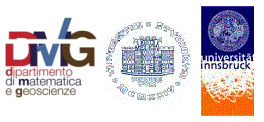The purpose of this Summer School is to introduce the audience to both mathematical and computational aspects of linear algebra and matrix theory relevant for applications in three major areas: network analysis, quantum chemistry and dynamical systems. While these applications appear to be rather far removed from one another, there are interesting points of contact and even overlaps among them.
M. Benzi will present theory and numerical methods for matrix functions, primarily for real symmetric matrices, with applications to network analysis and quantum chemistry. His lectures will emphasize issues related to sparsity, decay, and the use of computational methods based on Chebyshev polynomials, the Lanczos algorithm, and matrix moments.
M.L. Overton will present theory and numerical methods for nonsymmetric matrices, primarily motivated by applications in dynanical systems. For nonsymmetric (or more specifically, non-normal matrices), the familiar analysis of matrices based on eigenvalues and eigenvectors is unreliable partly because these quantities can vary rapidly with small perturbations to the matrix and partly because they model only asymptotic behavior of dynamical systems, not transient behavior. The notions of pseudospectra and spectral value sets (sometimes known as structured pseudospectra) are often more appriate choices to model growth or decay of dynamical systems (in discrete or continuous time).
The main prerequisites are a basic knowledge of linear algebra and numerical analysis and familiarity with MATLAB. The necessary background material will be provided during the lectures or by means of printed material distributed in advance of the course.
